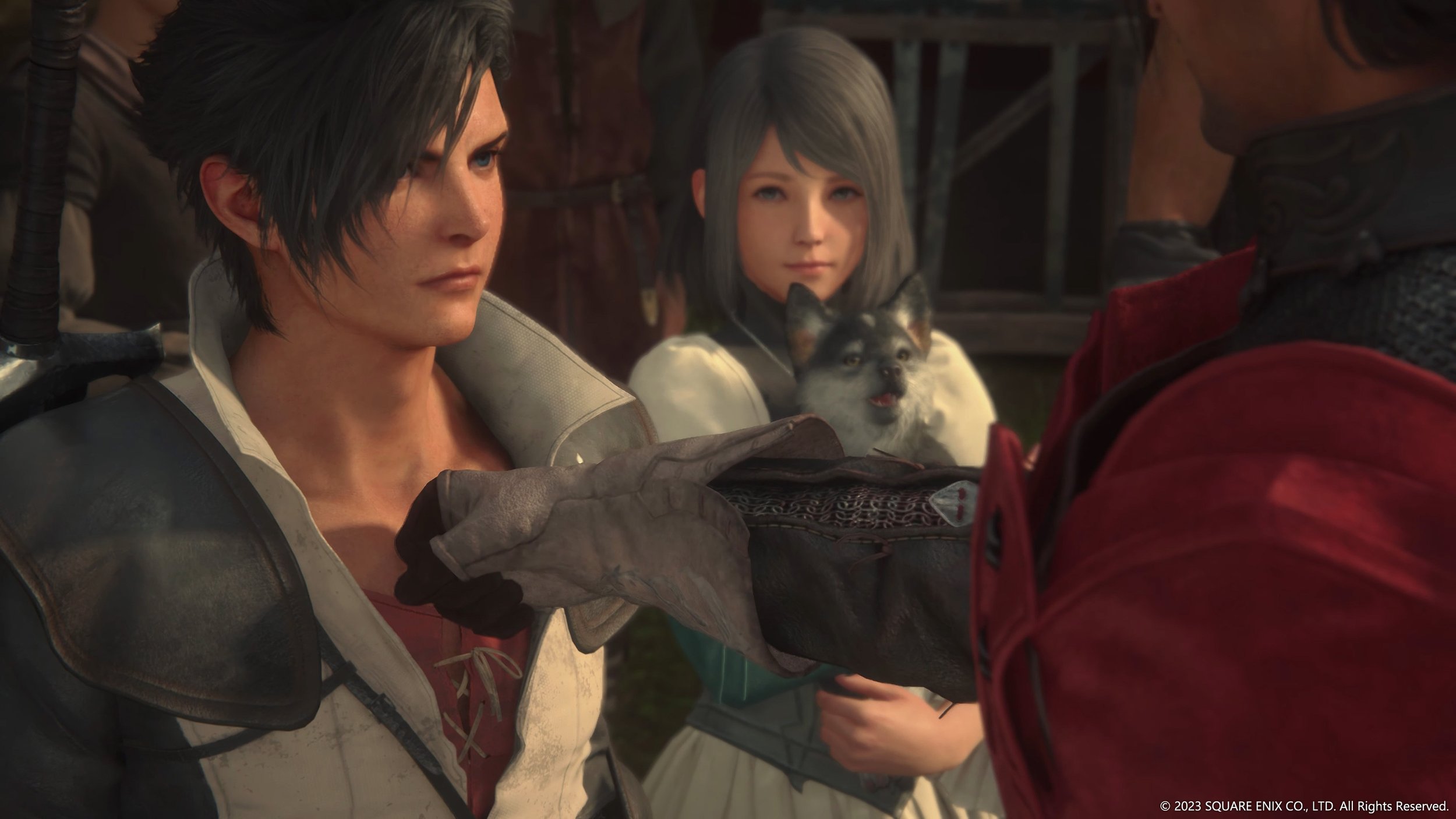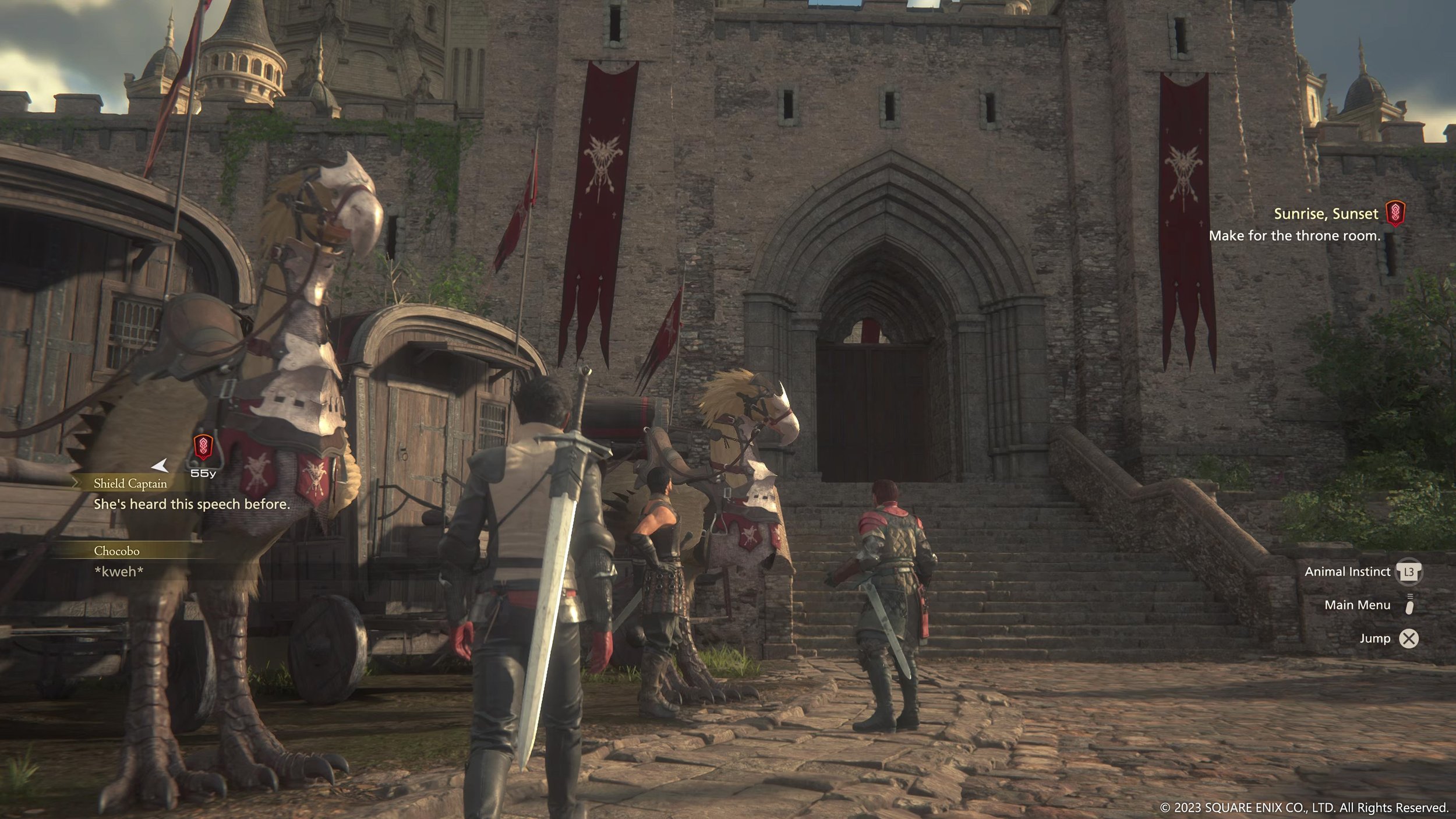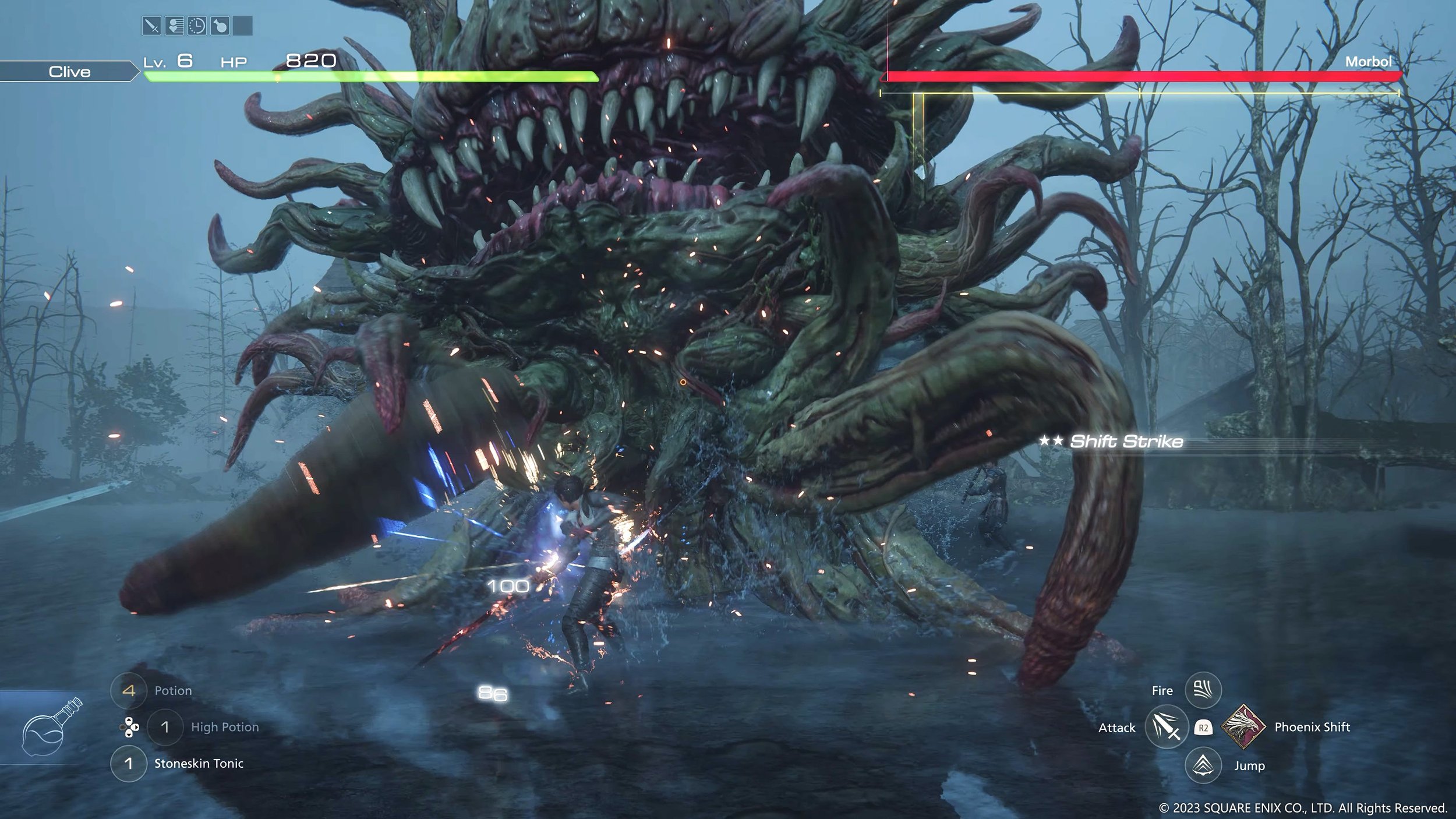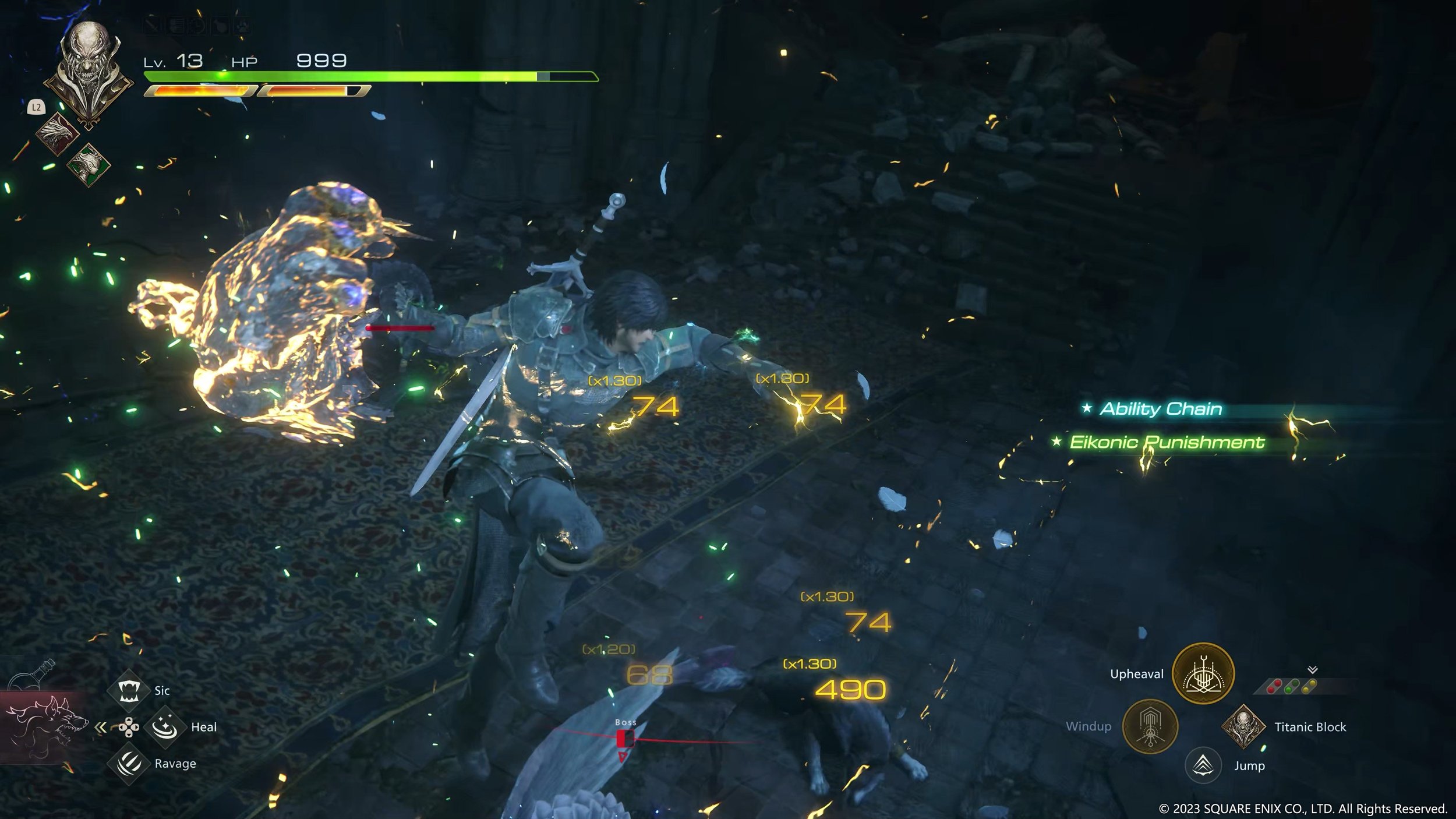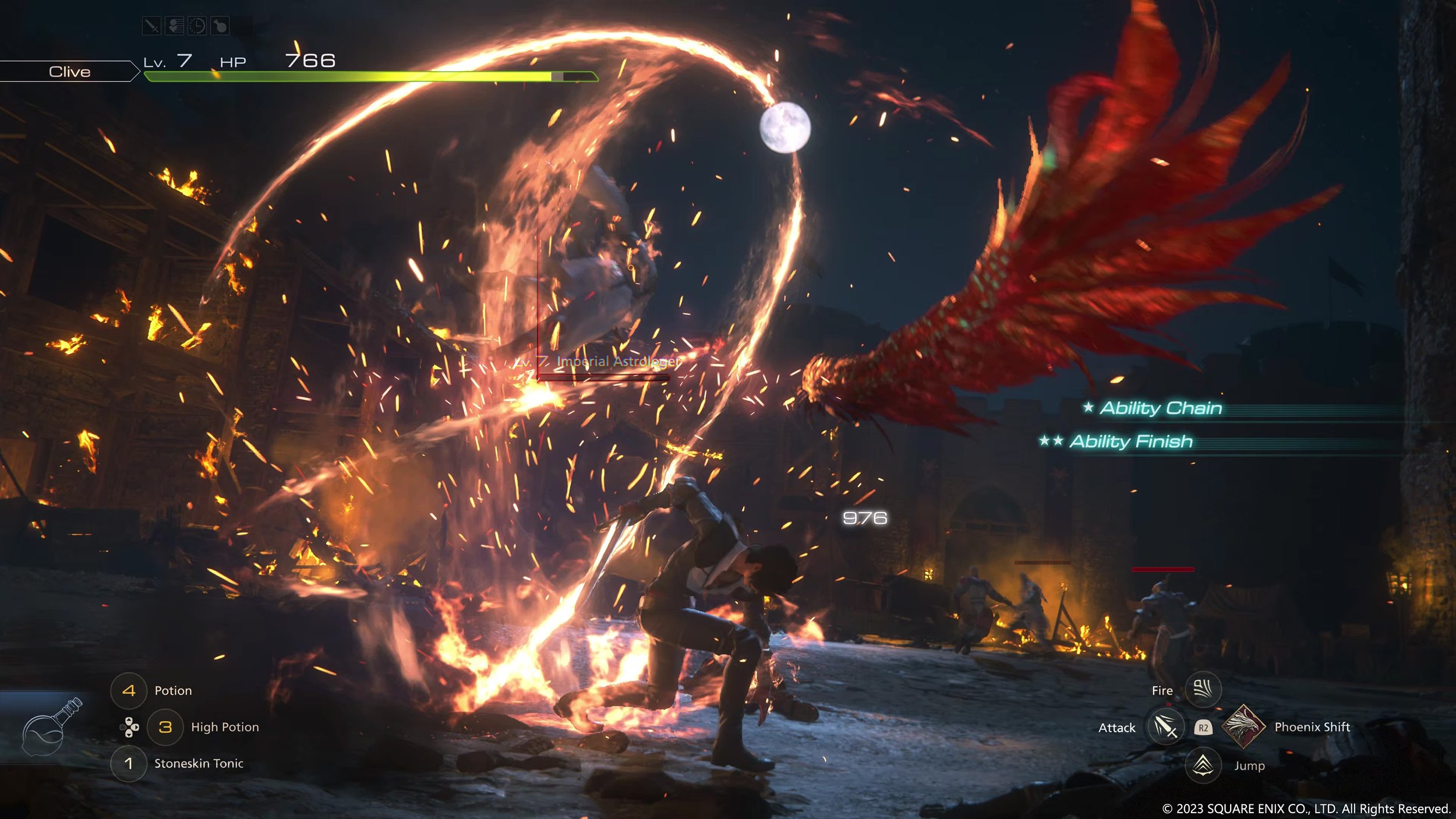Final Fantasy XVI - Review

I want to create a world, where people can choose not just how they die. But how they live. That’s what we’re fighting for.
Spoiler Warning
Before we get into it. For those wanting to avoid spoilers, Final Fantasy XVI is easily the best game of the year so far. It is easily one of the best Final Fantasy games, and one of the best action RPGs in the last twenty years. There won’t be major spoilers ahead, but there is an inevitable amount of smaller spoilers that will come up whilst going over the game mechanics and progression. So read on with knowledge of that.
Final Fantasy XVI is an incredibly adult, forward thinking game with a fantastic thoughtful story and an engaging gameplay loop. The real genius of Final Fantasy XVI is in the decision to finally acknowledge that real human behaviour can be reflected in a Fantasy environment, with an understanding of a player base that has actually become adults. Slavery, abuse, swearing and even sex. There is a focus of allowing characters of wild power to actually come across as human. The power of sex is used to manipulate entire nation’s and leaders into doing the whims of another, greater power. Subjugation of people who are different for the benefit of the majority. There is an incredibly smart weaving of real life historical problems, modern day issues, and adult behaviour to create a world that is far more nuanced and detailed than any previous Final Fantasy game.
Final Fantasy XVI takes place in a world where there is a necessity for everyday tasks to be completed with the use of magic. From filling water glasses, to lighting cigars or cigarettes and even heating a blacksmith’s forge. This is a world filled with mostly non-magical persons, who have constitutionally decided that Bearers - persons with the ability to use magic without aid, are a commodity that are bought and sold, in a slave-like system. Final Fantasy XVI is a journey to fight back against the repression and abuse that Bearers have faced. To allow people not only an opportunity to choose how they would die, but also how they get to live. To free those who were born different, branded for the rest of their lives. A myriad cast of character’s bond together to form The Resistance. Cid’s merry little band of freed Bearers, people trying to fight against the inequality of the world, as well as save it from a blight that is slowly bleaching all the magic, life and power from the world. A story that takes place over nearly ten years, that involves genocidal behaviours, a looming threat that aims to destroy all life and a journey to change the entire world, whilst dealing with all the hatred that comes as a result. There is a journey of many stories that occur across Final Fantasy XVI. Romances, resistance, a fight for freedom, a battle against a greater evil. There is a myriad of interweaving stories, with their own unique effect on the world and the characters involved. Valisthea feels alive at all times.
This extends into the beauty of ensuring the world does feel lived in. Everywhere you go, every town, every time you go back to the Resistance headquarters. No matter where you go in the world, there is character’s talking, interacting and commenting on the events of the world. The world map changes as the blight spreads further and further, and the world develops as time passes and major events happen. There is a constant buzz, constant chatter. There is always something new to hear and listen to in passing. Despite everything that is happening, the world never feels empty. There is new monsters to fight, new chatter to hear, new quests. There is always something fresh and different to hear. Valisthea is full, despite everything, it always feels alive. And it always makes the world enjoyable to jump in to.
Smartly, the main narrative doesn’t take allow itself to get side-tracked by the side quests of the game. Almost all side quests build towards the greater overall story. Each storyline is applicable to the overarching one of the game, rather than detracting or purposefully pulling you away from the main story. The decision to back-load the game with the majority of the side quests means that you get to experience the majority of the story before you get distracted with side content. That means you get the opportunity to actually experience the bulk of the story and the world, before it becomes a matter of tying up loose ends. A journey to the end, where everything becomes the end makes the most sense. So the journey makes more sense.
It is, however, the cast of characters that truly make the world of Final Fantasy XVI come to life. The huge focus on humanity and making the character’s feel more true to life, results in a world filled with far more intricate and deeper characters than previous entries. You play as Clive Rosfield, the elder but ‘rejected’ son of the Rosfield Duchy. A man who watched his whole family die, was shipped off to fight on the frontlines of the empire who betrayed and took his family from him. Through meeting Cidolfus, you escape the subjugation and begin on a journey to save the world. Save it from the Blight, save the Bearers from the abuse, and to battle back a far more sinister threat lurking beneath the surface. Jill and Clive have one of the purest, least forced and most understanding love story ever told in a Final Fantasy game. There is a constant reminder of love, family and happiness. The pain of losing a parent, the pain of losing family. The beauty of birth. Even the minor characters like Goetz and Lady Charon, are given their moments. Goetz being a soft hearted, lovable galoot. Lady Charon being a hardened woman with a mind for opportunity. The villains are not innately evil people, but tortured persons attempting to navigate a world that lofts them above others for simply being born differently again. Dominants of power, respected for their power, despite their magic brethren in the Bearers being subjugated and abused. The story moulds an incredibly powerful cast together and allows for a unique journey.
As with everything, not all is perfect. Particularly with the world that is crafted it also seems that some areas simply got overlooked for the sake of it. There is this constant reminder throughout the game that there is meant to be eight Eikons of power. Powerful summons to represent each element. But for whatever reason, Leviathan as the Water Eikon is completely overlooked. There is only a single mention of it throughout the game, and it is completely baffling for its absence. Every other Eikon is brought in to the combat system in some way, shape or form, to bolster your combat abilities. Leviathan is completely left out, and this does seem to happen uncomfortably often across a plethora of storylines. Stories that are 90% completed, but seem to fall off the wagon with a complete rounding off. There is character’s that seem to be introduced for a major plot device, only to never follow up on it. Leviathan’s exclusion is the biggest example of this, being that they reference him once only as ‘Leviathan the Lost’, implying there is a reason there is no Dominant for Leviathan, but it is completely left out as to why. Whilst it does make a huge difference, it does seem baffling to have crafted an incredibly deep and expansive story, that falls apart in a massively key area.
Thankfully, the rest of the Eikons, and by association their Dominants, are an incredibly well developed part of the game. By extension the combat system designed around the different Eikons also leads to a rather simple, but deeply enjoyable combat system. Different Eikons are unlocked across the game, that give you a new element type, a set of combat abilities that do a range of damage and stagger, with another more combat useful technique ranging from a flaming charge to a building gauge of a one hit mega hit. You’ll have three sets of Eikon abilities, with a selection of eight varieties by the end of the game. This allows for different magic to be used, but there does appear to be a decision to remove magic weakness as a mechanic of the game. The focus is on melee combat around staggering enemies and keeping them downed whilst you whack away, with perfect dodges and counter strikes when you can. The focus on upbeat, slick and enjoyable combat that doesn’t feel unfair or punishing for being less than stellar at it.
The Yoshi P cinematic influence is definitely felt with the games cutscenes, but most particularly with the battles between Dominants. Huge battles between the Eikons themselves. Particularly an encounter against Titan and Bahamut, both of which take you to ridiculously over the top extreme cinematic style battles, with enough actual combat in them to keep them from feeling like a QTE cinematic. Interestingly, the love for QTEs is incredibly evident across the game with button spams, attack and dodge QTE events throughout major story battles. The cinematic parts are incredibly cinematic, whilst the story parts are heavily narrative filled and the gameplay sections allow you to just play the game for hours at a time. There is a clear separation at the points that need it, and means that no section feels suffocated by the other parts.
On the note of cinematic impressiveness, Final Fantasy XVI is a wildly impressive looking game. Every part of the world is intricately and uniquely crafted. Particularly the designs for the Eikons, and in particular the boss battles with them are some of the most impressive scenes in a game I’ve ever experienced. The impressive nature of the world and visual design is matched only by the expansiveness of the lore and background that builds the world itself. Everything in Final Fantasy XVI is designed to be larger than life and expansive, and yet maintains the humanity of its actual characters.
To make itself infinitely more approach, Final Fantasy XVI has two initial difficulties, with a much more difficulty higher scaling one for New Game+. The base game allows you to play action-oriented or story-oriented, the ability to switch between the two at any point in time. This means that for almost all players there will be a level of accessibility to the game that matches up to your own skill and preferences, with the ability to switch between the two when you are less or more confident. It does make the side content features like Hunts and Trials a little more convoluted as you can switch to an easier difficult to make these easier, but for the most part the Action oriented difficulty actually seems the most accessible. New Game+ is a significant step up in difficulty, even with the expanded level cap and new ultimate weapon, and will prove to be an enjoyable extended experience of the fifty to sixty hour experience of the base game. Even just a story focused experience will take you upward of thirty hours to fully experience the game.
Perhaps most disappointing is the musical direction of Final Fantasy XVI. Whilst there is some remix versions of older more iconic tracks. Such as the battle theme being reminiscent of Final Fantasy VIII’s music track, there are very few standout tracks. Masayoshi Soken has done a solid job, but unfortunately sort of lacks the nuance and stand out tracks that we’ve come to expect from prior titles. Whilst it doesn’t detract it does mean that there is no tracks that will keep you coming back over and over. A small part normally, but music is a huge part of what makes Final Fantasy what it is.
Final Fantasy XVI is a masterpiece. It focuses enough on areas of character development and visual design, whilst actively pushing for a more action-focused gameplay loop with huge cinematic components for key moments. A hugely expansive world that looks at different elements of humanity, bringing them into a far more nuanced and adult method of storytelling than has previously been seen in the Final Fantasy series. A game designed to be far more adult, with characters that are far deeper than the superficial every-mans of most fantasy RPG games. Yoshi P has definitely attempted to revive the life of the Quick Time Event to a relatively high success and the periods of cinematic versus action are highly thought out and makes the story beats hit harder. Nothing in the world is perfect, but Final Fantasy XVI may be the closest a game in the series has ever gotten to achieving perfection.
The Score
10
Review code provided by Square Enix
The Pros
+Impressively visual cinematic battles
+Beautifully crafted story
+Adult themes treated as they should be
+Solid NG+ mode
+QTEs are actually done well
The Cons
-Music lacks the standout nature of previous titles
-Some stories feel like a major aspect have been cut out
-Flippance with difficulty switching defeats the purpose

